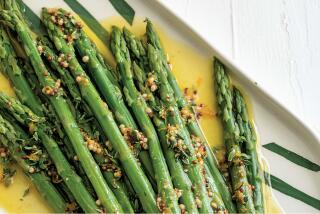Chips expand beyond potato and corn; a garden awaits
- Share via
Move over, potato and corn chips. There’s a cornucopia of other vegetables making its way to the grocery store snack aisle.
Whether it’s black bean chips or dehydrated cabbage, sprouted sweet potato tortilla crisps or baked and salted peas, the options in the $560-billion global snack food market are expanding along with the waistlines of Americans and their desire to eat more healthfully.
“For me, it’s about eating smart but not giving up things that taste good,” said Doug Foreman, founder of Beanitos, in Austin, Texas. Since launching its line of black bean chips in 2010, Beanitos has become the fastest-growing natural snack chip on the market, according to Spins, a natural product research firm.
Although chips made from corn or potatoes are increasingly available in varieties with less fat or salt, snack chips made from beans and other legumes, such as lentils and peas, can be higher in fiber, which leaves snackers feeling fuller with fewer calories. They are, however, still snack chips.
“Even snacks claiming they’re better for you are still an indulgent item. You’re still getting sodium and fat,” said Todd Kluger, vice president of marketing for Lundberg Farms in Richvale, Calif. Lundberg Farms makes gluten-free chips from whole-grain, organic rice that is not genetically modified. Even so, Kluger said, “we don’t claim a health benefit from an indulgent snack. We recognize it’s part of a healthy balanced diet.”
So do most Americans. According to the 2012 consumer snacking study from the Symphony Group, 46% of consumers view snacks as part of a healthful eating plan; 60% are seeking snacks that offer attributes beyond basic nutrition, such as organic or low-glycemic (which has less negative effect on blood sugar levels) or minimally processed ingredients.
“Calorically, our veggie chips do have fat and sugar. Fats from whole foods, such as soaked cashew nuts or sesame seeds, are in their natural state. The body is able to digest them more easily,” said Penny Ann Horowytz, founder of Alive & Radiant Foods in Berkeley, which makes chips from dehydrated organic kale, arugula, sweet onion, collard greens and other vegetables few people typically associate with snack foods. They are, surprisingly, delicious.
Like any snack, vegetable-based chips “have to taste good first,” said Steve Kneepkens, vice president of sales and marketing for Calbee, in Fairfield, Calif. The maker of Snapea Crisps is about to expand from its popular baked pea snacks into salty crisps made from lentils. “The sweet potatoes, the lentils, plantains and other vegetable snacks are growing in popularity because they offer different nutritional opportunities, and they taste good too.”
For many vegetable snack chip makers, it isn’t enough to merely make a tasty chip from something as unexpected as cassava root or collard greens. They also offer them in flavors appealing to consumers who like to experiment with a globe’s worth of tastes, such as Thai basil, teriyaki, wasabi, pico de gallo and cucumber and dill.
“Consumers are increasingly looking for more variety in all their products,” said Christopher Clark, spokesman for the Snack Food Assn. in Arlington, Va. “Years ago, you had barbecue or sour cream and onion potato chips. Now you have everything from chipotle to beer battered and cheddar. There’s a lot of opportunity to do interesting things with flavors and ingredients, which brings you to the vegetable and bean chips and rice-based snacks we’re seeing today.”
Though snacks perceived as more healthful are outpacing much of the market, different permutations of potato and tortilla chips are projected to grow even more quickly than the many types of vegetables that are now being fried, baked and dehydrated into salted snack chips, according to the Snack Food Assn. That’s good news for consumers, who now have more snacking variety than ever in products that match their dietary values and health goals.
More to Read
Eat your way across L.A.
Get our weekly Tasting Notes newsletter for reviews, news and more.
You may occasionally receive promotional content from the Los Angeles Times.










